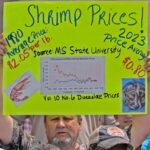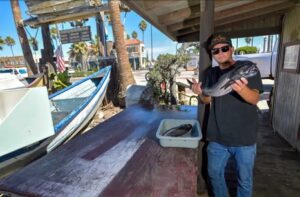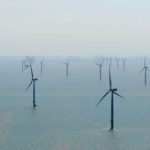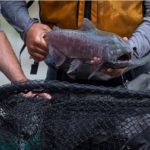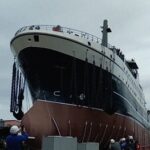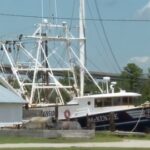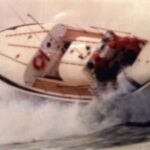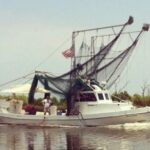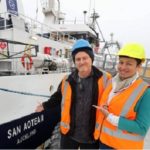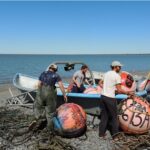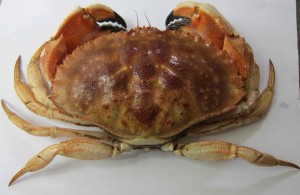Tag Archives: British Columbia
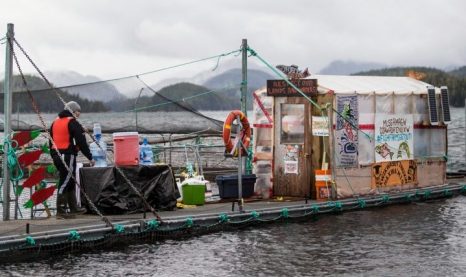
British Columbia court grants injunction to fish farm, ending protests
A B.C. Supreme Court judge has granted an injunction to Marine Harvest Canada’s Midsummer Island farm, which is located amid a series of islands in the Broughton Archipelago, about 50 kilometres east of Port Hardy on Vancouver Island. Protesters began occupying the farm in September, although Molina Dawson, a protester with the Musgamagw Dzawada’enuxw Nation, said they scaled back their activity while the legal proceedings were underway. Justice Peter Voith said in the decision that the protesters’ presence “gives rise to real safety issues” and he agrees that Marine Harvest will suffer irreparable harm if the occupation of the farm continues. click here to read the story 15:24
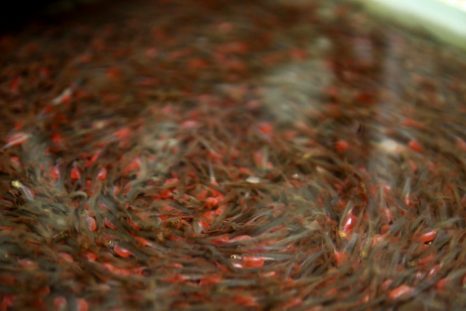
Hatchery Fish Often Fail in the Wild. Now We Might Know Why
Wild salmon are struggling to get their groove back.,, For years, Canada has tried to help bolster the salmon population by releasing hatchery-raised juvenile fish, or smolts, into the wild. Scientists know these hatchery smolts don’t do well in the wild—the fish tend to die younger than their wild brethren and reproduce less, but it’s unclear why. In a recent study, however, researchers think they’ve hit upon a possible explanation.,, In Washington State, hatchery-spawned steelhead also do poorly in the wild. click here to read the story 12:31
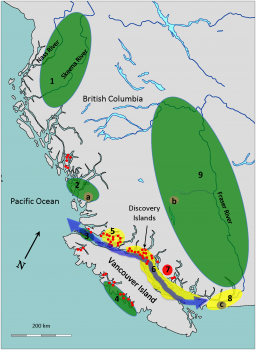
New research shows wild salmon exposed to fish farms have ‘much higher’ rate of disease
Wild salmon exposed to open-net fish farms are much more likely to be infected with piscine reovirus (PRV) than those that don’t have that contact, a new study has concluded. The data also show that the virus makes it more difficult for wild salmon to swim upstream to their spawning grounds, which has major implications for the sustainability of the populations. “The government has to remove this industry from the key salmon migration routes or we risk the complete loss of wild salmon in this province,” said Alexandra Morton, lead author on the report and an outspoken advocate for wild salmon. click here to read the story 18:07
The effect of exposure to farmed salmon on piscine orthoreovirus infection and fitness in wild Pacific salmon in British Columbia, Canada – click here to read the study
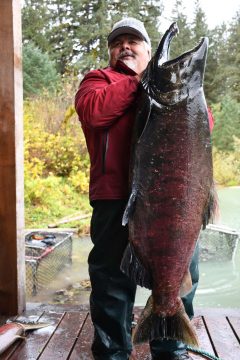
This area of Canada is becoming known for its truly gigantic salmon
Ted Walkus may have made the catch of the year at Rivers Inlet, B.C. Walkus, a hereditary chief of Wuikinuxv First Nation, caught a salmon that makes the fish most of us see at the supermarket look like sardines. It was a 50-pound monster, nearly as tall as Walkus himself. Catching a fish this big isn’t a total anomaly in the area. Rivers Inlet is known as something of a lost world, one of the only places on Earth where massive Chinook salmon are born. The biggest-ever salmon caught in the area was an incredible 83.3 pounds. click here to read the story 15:50
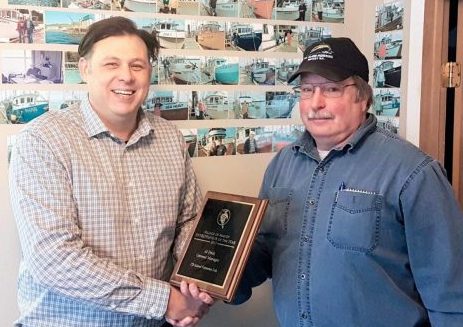
CB Island Fisheries nets Masset’s Entrepreneur of the Year Award
When C B Island Fisheries stepped up to process sport-caught fish this spring, it saved a half-dozen jobs from swimming away off-island. “They greatly expanded this year,” says Masset Mayor Andrew Merilees, who presented the award last week to CBI General Manager Al Frick. After 22 years in business, CBI is a “heartstone” business that goes to Masset’s origins as a fishing community, said Merilees, but this year they took a new and much-needed turn when Haida Wild, the only other fish processor in Masset, stopped handling sport-caught fish this spring. click here to read the story 18:37
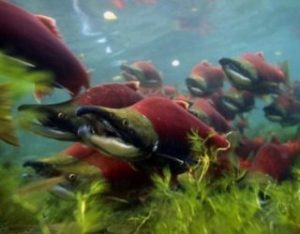
Fraser River Sockeye salmon recommended for listing under Species At Risk Act
The recommendation, announced Monday by the Committee on the Status of Endangered Wildlife in Canada, an independent scientific body that advises the federal government, is the most significant acknowledgement to date of the jeopardy facing the iconic red-bodied fish that was once the mainstay of British Columbia’s salmon industry. “It’s a signal of a larger issue,” said Eric Taylor, committee chair and fish ecologist at the University of British Columbia. “The Fraser River is having trouble supporting these fish.” click here to read the story 14:37
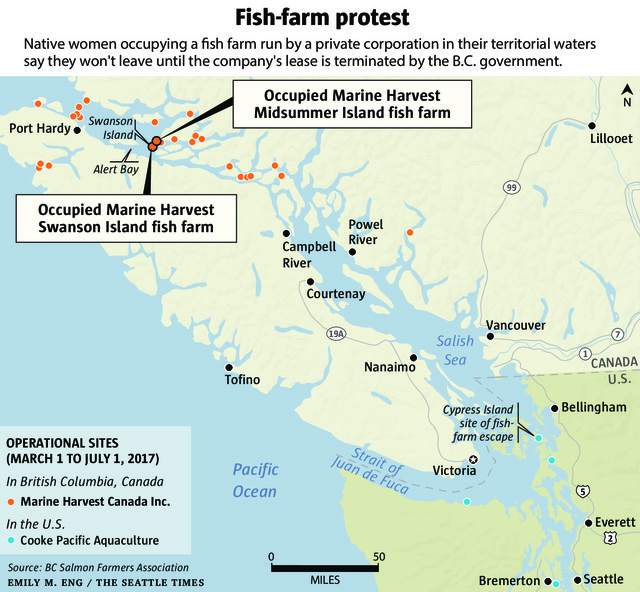
Salmon-farming operations face protests, occupations in B.C., legislative scrutiny in Washington state
A showdown is brewing over Atlantic salmon net-pen farming on both sides of the U.S.-Canada border. Marine Harvest, a major producer of farmed Atlantic salmon in British Columbia, is seeking a court order to evict First Nations women who have occupied one of its fish farms, an order it intends to enforce by police action if necessary, said Ian Roberts, spokesman for the company. Marine Harvest operates 11 open-water Atlantic salmon net-pen farms in the Broughton Archipelago alone, at the northeast end of Vancouver. Ten of the farms have leases that are up for renewal by the B.C. government in June, and two of those farms have been occupied by First Nations people who say they won’t leave until the leases are canceled. click here to read the story 12:04
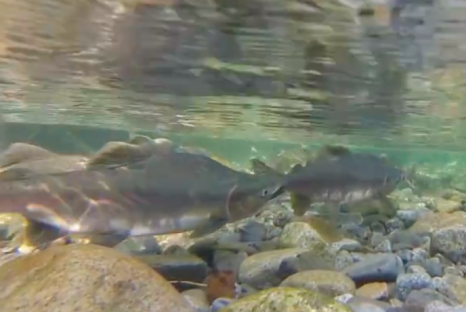
British Columbia: What is behind the sockeye salmon collapse?
The sockeye salmon run this year, is, according to Fisheries and Oceans Canada and other reputable sources, down considerably. The reason for this, depends on who you talk to. Aaron Hill, executive director of Watershed Watch Salmon Society, says part of the problem is the fisheries ministry has dragged its feet on the Cohen Commission recommendations. The Cohen Commission, created in 2009, issued a report in 2012 with 75 recommendations on how Fisheries and Oceans Canada (working with its provincial partner) could monitor and safeguard the Pacific salmon fisheries. click here to read the story 11:43
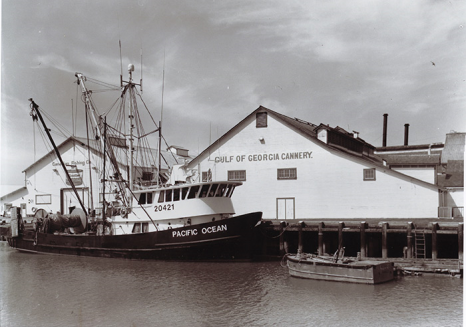
Photo Article: How BC’s Multicultural Fishing Industry Shaped the Province
Fishing has always been a fundamental part of life in British Columbia, particularly near Steveston. Because of the area’s natural abundance and proximity to salmon spawning grounds, Coast Salish First Nations were able to live off the area’s resources since time immemorial. Settlement in coastal areas soon began to swell and in the 1800s, Japanese, Chinese, and European immigrants joined the First Nations in harvesting and processing the catch. Then came the canneries. click here to view the photo’s, read the story 09:40
Creation of a new marine protection area off British Columbia upsets fishing industry
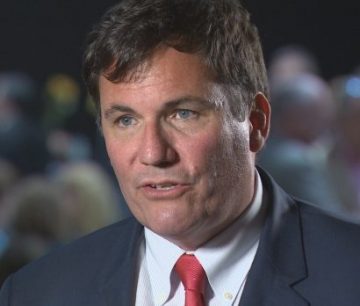 Canada’s largest commercial fishermen’s union says the creation of a new marine protection area off British Columbia’s north coast will result in lost jobs and higher prices for seafood. The Canadian Independent Fish Harvesters’ Federation says the protection area goes too far in banning all fishing in several regions between Vancouver Island and the archipelago of Haida Gwaii. Jim McIsaac, the group’s Pacific vice-president, says the union supports safeguarding the region’s glass sponge reefs but he regrets that the Fisheries Department hasn’t followed the group’s advice after seven years of consultation. The federal government is expected to announce the new protection area on Thursday. Fisheries Minister Dominic LeBlanc says the federal government does not believe preserving the glass-sponge conservation area is an either/or proposition and that it’s possible to do so while balancing the interests of the commercial fishing industry. Read the rest here 16:18
Canada’s largest commercial fishermen’s union says the creation of a new marine protection area off British Columbia’s north coast will result in lost jobs and higher prices for seafood. The Canadian Independent Fish Harvesters’ Federation says the protection area goes too far in banning all fishing in several regions between Vancouver Island and the archipelago of Haida Gwaii. Jim McIsaac, the group’s Pacific vice-president, says the union supports safeguarding the region’s glass sponge reefs but he regrets that the Fisheries Department hasn’t followed the group’s advice after seven years of consultation. The federal government is expected to announce the new protection area on Thursday. Fisheries Minister Dominic LeBlanc says the federal government does not believe preserving the glass-sponge conservation area is an either/or proposition and that it’s possible to do so while balancing the interests of the commercial fishing industry. Read the rest here 16:18
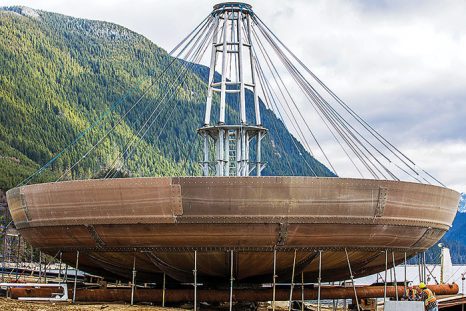
Bill C—228: Federal NDP MP proposes bill requiring fish farming be done in closed containment
Bill C—228, a bill that would require fish farming to be carried out in closed containment facilities, is on the table in the House of Commons and will be given a second reading sometime during the current session of Parliament. The private members bill was first introduced by Fin Donnelly, NDP MP for Port Moody —Coquitlam, in February, 2016. The bill amends the Fisheries Act. The proposed amendments state that licences for finfish aquaculture would not be issued unless they will be carried out in a closed containment facility and that no one shall carry out finfish aquaculture in Canadian fisheries waters off the Pacific Coast unless in a closed containment facility and with the proper license. Read the rest here 17:33
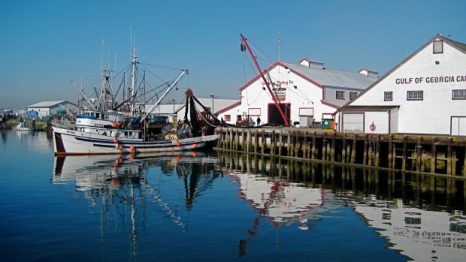
Ottawa investing $33.5M in British Columbia harbour improvement projects
The federal government announced it will invest $33.5 million to carry out harbour improvement projects — including wharf construction, maintenance and dredging — at 29 small harbours throughout B.C. “Small craft harbours are the hub for our fishing industry,” said Joe Peschisolido, Liberal MP for Steveston-Richmond, who announced the funding on Aug. 31. “Fish is actually now our second most important food export after wheat, and creates a lot of economic activity. If you want to create wealth … you want to have an efficient economy, you need infrastructure and small craft harbours are an integral part of our infrasturure. Almost a third of that funding will go to the Steveston Harbour Authority in Richmond, which serves over 500 commercial fishing vessels. Read the story here 16:12
BC Fisheries Workers Demand Rule Changes From Federal Government
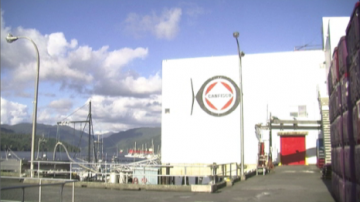 Representatives of BC shoreworkers and commercial license holders are in Ottawa today, demanding changes to federal legislation in order to save fish processing jobs on the North Coast. They want Ottawa to require local processing and individual licence ownership — which has become a huge issue in the wake of last November’s announcement by Canfisco that it was shutting down its Prince Rupert cannery – resulting in hundreds of job losses. Skeena-Bulkley Valley MP Nathan Cullen says there’s a lot riding on the meeting. He says coastal communities are being devastated by federal policies which allow North Coast fish to be processed in China and Alaska — and which permit nearly 80 per cent of commercial licences to be bought up by large corporations. Read the press release here 18:32
Representatives of BC shoreworkers and commercial license holders are in Ottawa today, demanding changes to federal legislation in order to save fish processing jobs on the North Coast. They want Ottawa to require local processing and individual licence ownership — which has become a huge issue in the wake of last November’s announcement by Canfisco that it was shutting down its Prince Rupert cannery – resulting in hundreds of job losses. Skeena-Bulkley Valley MP Nathan Cullen says there’s a lot riding on the meeting. He says coastal communities are being devastated by federal policies which allow North Coast fish to be processed in China and Alaska — and which permit nearly 80 per cent of commercial licences to be bought up by large corporations. Read the press release here 18:32
Alaska, British Columbia sign transboundary MOU
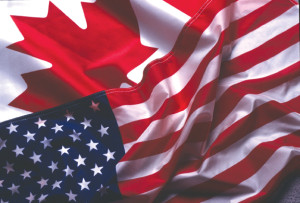 Gov. Bill Walker and British Columbia Premier Christy Clark signed a Memorandum of Understanding Wednesday morning committing to cooperation on transboundary issues, particularly related to concerns about mines on the Canadian side of the border that share waterways with near Southeast Alaska. The MOU will create a Bilateral Working Group on the Protection of Transboundary Waters that will facilitate the exchange of best practices, marine safety, workforce development, transportation links and,,, Read the article here 12:30
Gov. Bill Walker and British Columbia Premier Christy Clark signed a Memorandum of Understanding Wednesday morning committing to cooperation on transboundary issues, particularly related to concerns about mines on the Canadian side of the border that share waterways with near Southeast Alaska. The MOU will create a Bilateral Working Group on the Protection of Transboundary Waters that will facilitate the exchange of best practices, marine safety, workforce development, transportation links and,,, Read the article here 12:30
First Nations seek meeting with fisheries minister
Members of the First Nations Wild Salmon Alliance in British Columbia have written to federal 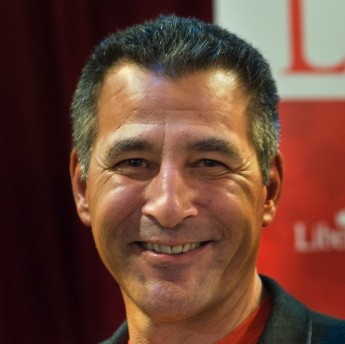 , requesting an urgent meeting to discuss plunging salmon returns in the province’s rivers. The alliance’s Chief Bob Chamberlin says six million sockeye salmon were forecast for the Fraser River this year, but only two million fish arrived, while 14 million pink salmon were expected, but barely one-third showed up. Read the rest here 18:56
, requesting an urgent meeting to discuss plunging salmon returns in the province’s rivers. The alliance’s Chief Bob Chamberlin says six million sockeye salmon were forecast for the Fraser River this year, but only two million fish arrived, while 14 million pink salmon were expected, but barely one-third showed up. Read the rest here 18:56
British Columbia approves reopening of Mount Polley mine after tailings spill; may threaten downstream Alaska watershed
 The provincial government on Thursday approved a restart of Imperial Metal’s Mount Polley mine, which has been closed since its waste dam failed last August and released 6.6 billion gallons of toxic tailings including arsenic, lead and nickel into salmon-producing lakes and streams of the Fraser River watershed. Residents of southeastern Alaska, many of whom depend on fishing and tourism for their livelihoods, expressed concern at the announcement. Read the rest here 10:57
The provincial government on Thursday approved a restart of Imperial Metal’s Mount Polley mine, which has been closed since its waste dam failed last August and released 6.6 billion gallons of toxic tailings including arsenic, lead and nickel into salmon-producing lakes and streams of the Fraser River watershed. Residents of southeastern Alaska, many of whom depend on fishing and tourism for their livelihoods, expressed concern at the announcement. Read the rest here 10:57
Fighting Over Herring – the Little Fish That Feeds Multitudes
 But for the second straight year, the Canadian government has ignited a skirmish in British Columbia by moving to let fishing nets scoop up spawning herring, despite objections from scientists, Native people, and even commercial fishing groups. “Last year it almost got to a war—locals were geared up to block fishing boats in port,” said Tony Pitcher, a fisheries scientist with the University of British Columbia. “There were more police on the dock than there were local people.” Read the rest here 08:47
But for the second straight year, the Canadian government has ignited a skirmish in British Columbia by moving to let fishing nets scoop up spawning herring, despite objections from scientists, Native people, and even commercial fishing groups. “Last year it almost got to a war—locals were geared up to block fishing boats in port,” said Tony Pitcher, a fisheries scientist with the University of British Columbia. “There were more police on the dock than there were local people.” Read the rest here 08:47
Laine Welch: Pacific halibut stock on the rebound
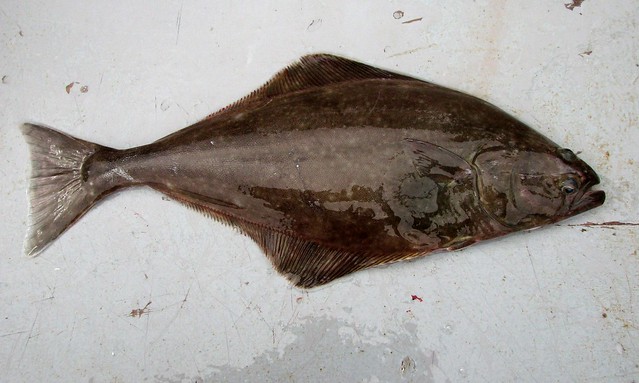 The Pacific halibut stock appears to be rising from the ashes, and that bodes well for catches in some fishing regions next year. It would turn the tide of a decades-long decline that has caused halibut catches to be slashed by more than 70 percent in . Read the rest here 15:22
The Pacific halibut stock appears to be rising from the ashes, and that bodes well for catches in some fishing regions next year. It would turn the tide of a decades-long decline that has caused halibut catches to be slashed by more than 70 percent in . Read the rest here 15:22
Sustainability of land-based salmon farming recognised
 Chief Bill Cranmer, who addressed a similar workshop held in New Brunswick earlier this year, presented on the performance of the Namgis First Nation’s KUTTERA closed-containment project in British Columbia. KUTERRA also received top ranking from the Monterey Bay Aquarium’s Seafood Watch programme. Read the rest here 08:22
Chief Bill Cranmer, who addressed a similar workshop held in New Brunswick earlier this year, presented on the performance of the Namgis First Nation’s KUTTERA closed-containment project in British Columbia. KUTERRA also received top ranking from the Monterey Bay Aquarium’s Seafood Watch programme. Read the rest here 08:22
Canada: Financial Boost for Three British Columbia Harbors
![]() “This Government understands that by investing in infrastructure at our small craft harbors we are also creating employment opportunities that benefit local communities and ensuring the livelihood of our fishing industry. <Read more here> 08:54
“This Government understands that by investing in infrastructure at our small craft harbors we are also creating employment opportunities that benefit local communities and ensuring the livelihood of our fishing industry. <Read more here> 08:54
Cowichan News Leader Opinion – Seeing both sides of a local fisheries blockade
![]() The case for Government officials have ignored or run roughshod over the rights of local Natives for as long as there has been a British Columbia.,,read more,, The case against Historical issues are certainly relevant, but ignoring today’s reality would be foolish. Read more here 18:18
The case for Government officials have ignored or run roughshod over the rights of local Natives for as long as there has been a British Columbia.,,read more,, The case against Historical issues are certainly relevant, but ignoring today’s reality would be foolish. Read more here 18:18
This year’s halibut season is starting up just in time in British Columbia
 “The freezers were all cleared out. The frozen market got really short, starting in November-December,” said Cody Smith, who works in import, export and wholesales sales at Albion Fisheries in Victoria. “The cupboards were bare going into the fresh season.” – Read more here timescolonist 14:46
“The freezers were all cleared out. The frozen market got really short, starting in November-December,” said Cody Smith, who works in import, export and wholesales sales at Albion Fisheries in Victoria. “The cupboards were bare going into the fresh season.” – Read more here timescolonist 14:46
Bizarre mass die-off of starfish in the waters around Vancouver, British Columbia baffles experts
 Jonathan Martin, a research associate at Simon Fraser University, has observed the mass die-off of both Sunflower seastars (Pycnopodia helianthoides) and morning sun stars (Solaster dawsoni) and has published photos and videos of the event on Flickr and YouTube. more@redorbit 09:25
Jonathan Martin, a research associate at Simon Fraser University, has observed the mass die-off of both Sunflower seastars (Pycnopodia helianthoides) and morning sun stars (Solaster dawsoni) and has published photos and videos of the event on Flickr and YouTube. more@redorbit 09:25
Oil spill would ‘overwhelm’ resources, B.C. minister warned
![]() Officials in British Columbia privately warned the environment minister that the province lacks the ability to manage oil spills from existing and future oil traffic, and even a moderate spill would overwhelm their ability to respond, documents show. more@cbcnews
Officials in British Columbia privately warned the environment minister that the province lacks the ability to manage oil spills from existing and future oil traffic, and even a moderate spill would overwhelm their ability to respond, documents show. more@cbcnews
Opinion: Feds must do more to protect BC salmon
Skeena River sockeye salmon are returning in desperately low numbers this summer, causing concern among conservationists for the future of one of British Columbia’s largest and most diverse salmon runs. The run collapse triggered closures of commercial and recreational fisheries in B.C., and restricted First Nations’ food fisheries. Meanwhile, commercial fisheries in Alaska intercepted large numbers of Skeena sockeye just over the border, less than 100 kilometres from the mouth of the Skeena River. more@terracestandard 15:52
Proof that people don’t understand the food production sector. Mr. Hill from the Watershed Watch proves it. Video
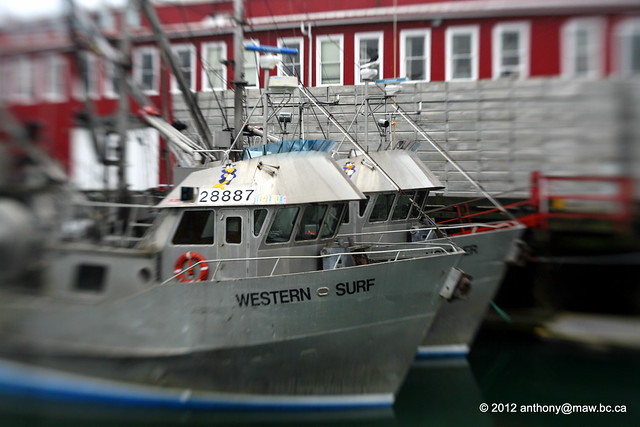 The commercial fishing industry has long claimed it strives to ensure salmon that can’t be legally kept are released alive and well. But a video shot for a conservation group in British Columbia shows seine boat crews kicking salmon across decks, or waiting for fish to stop moving before picking them up and throwing them overboard. more@globeandmail
The commercial fishing industry has long claimed it strives to ensure salmon that can’t be legally kept are released alive and well. But a video shot for a conservation group in British Columbia shows seine boat crews kicking salmon across decks, or waiting for fish to stop moving before picking them up and throwing them overboard. more@globeandmail
Should the government allow mass harvest of seaweed on the British Columbia coast?
Certainly there seems to be an overabundance of it on most beaches, where it often collects in long, thick mats known as wracks. A commercial seaweed harvest has been proposed for B.C. – a new “fishery” that would target an untapped resource potentially worth millions of dollars – but a study led by a group of retired fisheries scientists has raised concerns about its environmental impact. continued@globeandmail






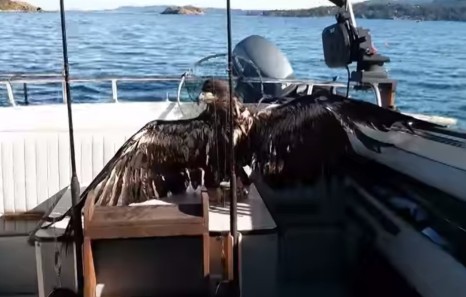
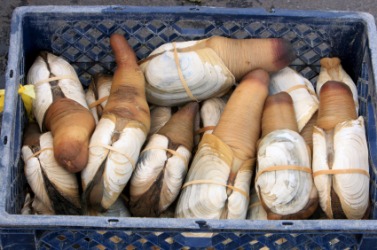 Canada’s Department of Fisheries and Oceans (DFO) has released its
Canada’s Department of Fisheries and Oceans (DFO) has released its 


























